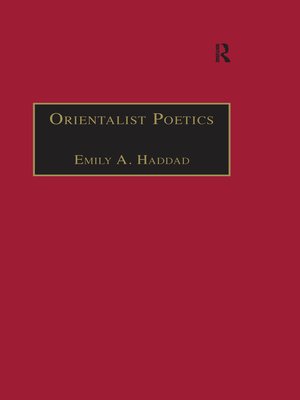Orientalist Poetics
ebook ∣ The Islamic Middle East in Nineteenth-Century English and French Poetry · The Nineteenth Century Series
By Emily A. Haddad

Sign up to save your library
With an OverDrive account, you can save your favorite libraries for at-a-glance information about availability. Find out more about OverDrive accounts.
Find this title in Libby, the library reading app by OverDrive.



Search for a digital library with this title
Title found at these libraries:
| Library Name | Distance |
|---|---|
| Loading... |
Orientalist Poetics is the only book on literary orientalism that spans the nineteenth century in both England and France with particular attention to poetry and poetics. It convincingly demonstrates orientalism's centrality to the evolution of poetry and poetics in both nations, and provides a singularly comprehensive and definitive analysis of the aesthetic impact of orientalism on nineteenth-century poetry. Because it examines the poetry of the entire century across both national literatures, the book is in a unique position to articulate the essential part orientalism plays in major developments of nineteenth-century poetics. Through probing discussions of an array of prominent nineteenth-century poets-including Shelley, Southey, Byron, Hugo, Musset, Leconte de Lisle, Wordsworth, Hemans, Gautier, Tennyson, Arnold and Wilde-Emily A. Haddad reveals how orientalism functions as a diffuse avant-garde, a crucial medium for the cultivation and refinement of a broad range of experimental positions on poetry and poetics. Haddad argues that while orientalist poems are often viewed mainly as artefacts of European attitudes towards the East and imperialism, poetic representations of the Islamic Orient also provide an indispensable matrix for the reexamination of such aesthetically fundamental issues as the purpose of poetry, the value of mimesis, and the relationship between nature and art. Orientalist Poetics effectively bridges the gap between the analysis of poetics and the analysis of orientalism. In showing that major poetic developments have roots in orientalism, Haddad's book offers a valuable and innovative revisionist view of nineteenth-century literary history.







